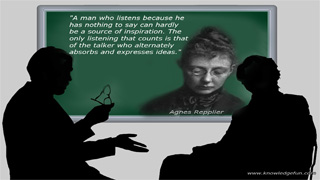The question of full or scanty notes arises in reading notes as in lecture notes. In general, your notes should represent a summary, in your own words, of the author's discussion, not a duplication of it. Students sometimes acquire the habit of reading single sentences at a time, then of writing them down, thinking that by making an exact copy of the book, they are playing safe. This is a pernicious practice; it spoils continuity of thought and application. Furthermore, isolated sentences mean little, and fail grossly to represent the real thought of the author. A better way is to read through an entire paragraph or section, then close the book and reproduce in your own words what you have read. Next, take your summary and compare with the original text to see that you have really grasped the point. This procedure will be beneficial in several ways. It will encourage continuous concentration of attention to an entire argument; it will help you to preserve relative emphasis of parts; it will lead you to regard thought and not words. (You are undoubtedly familiar with the state of mind wherein you find yourself reading merely words and not following the thought.) Lastly, material studied in this way is remembered longer than material read scrappily. In short, such a method of reading makes not only for good memory, but for good mental habits of all kinds. In all your reading, hold to the conception of yourself as a thinker, not a sponge. Remember, you do not need to accept unqualifiedly everything you read.
A worthy ideal for every student to follow is expressed in the motto carved on the wall of the great reading room of the Harper Memorial Library at The University of Chicago:
"Read not to contradict, nor to believe, but to weigh and consider."
Ibsen bluntly states the same thought:
"Don't read to swallow; read to choose, for 'Tis but to see what one has use for."
Ask yourself, when beginning a printed discussion, What am I looking for? What is the author going to talk about? Often this will be indicated in topical headings. Keep it in the background of your mind while reading, and search for the answer. Then, when you have read the necessary portion, close the book and summarize, to see if the author furnished what you sought. In short, always read for a purpose. Formulate problems and seek their solutions. In this way will there be direction in your reading and your thought.
This discussion of reading notes has turned into an essay on "How to Read," and you must be convinced by this time that there is much to learn in this respect, so much that we may profitably spend more time in discussing it.
Every book you take up should be opened with some preliminary ceremony. This does not refer to the physical operation of opening a new book, but to the mental operation. In general, take the following steps:
- Observe the title. See exactly what field the book attempts to cover.
- Observe the author's name. If you are to use his book frequently, discover his position in the field. Remember, you are going to accept him as authority, and you should know his status. You may be told this on the title page, or you may have to consult Who's Who, or the biographical dictionary.
- Glance over the preface. Under some circumstances you should read it carefully. If you are going to refer to the book very often, make friends with the author; let him introduce himself to you; this he will do in the preface. Observe the date of publication, also, in order to get an idea as to the recency of the material.
- Glance over the table of contents. If you are very familiar with the field, and the table of contents is outlined in detail, you might advantageously study it and dispense with reading the book. On the other hand, if you are going to consult the book only briefly, you might find it necessary to study the table of contents in order to see the relation of the part you read to the entire work.
- Use the index intelligently; it may save you much time.
You will have much to do throughout your college course with the making of bibliographies, that is, with the compilation of lists of books bearing upon special topics. You may have bibliographies given you in some of your courses, or you may be asked to compile your own. Under all circumstances, prepare them with the greatest care. Be scrupulous in giving references. There is a standard form for referring to books and periodicals, as follows:
Author's name, Title (Edition; Publisher, Date), Page number.







